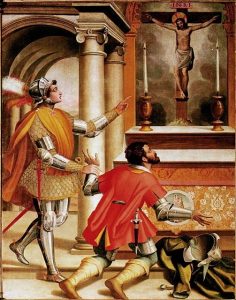St. Francis de Sales
The difference between love and devotion is just that which exists between fire and flame;–love being a spiritual fire which becomes devotion when it is fanned into a flame;–and what devotion adds to the fire of love is that flame which makes it eager, energetic and diligent, not merely in obeying God’s Commandments, but in fulfilling His Divine Counsels and inspirations.
The Nature and Excellence of Devotion
Those who sought to discourage the Israelites from going up to the Promised Land, told them that it was “a land which eateth up the inhabitants thereof; “that is, that the climate was so unhealthy that the inhabitants could not live long, and that the people thereof were “men of a great stature,” who looked upon the new-comers as mere locusts to be devoured. It is just so, my child, that the world runs down true devotion, painting devout people with gloomy, melancholy aspect, and affirming that religion makes them dismal and unpleasant. But even as Joshua and Caleb protested that not only was the Promised Land a fair and pleasant country, but that the Israelites would take an easy and peaceful possession thereof, so the Holy Spirit tells us through His Saints, and our Lord has told us with His Own Lips, that a devout life is very sweet, very happy and very loveable.
The world, looking on, sees that devout persons fast, watch and pray, endure injury patiently, minister to the sick and poor, restrain their temper, check and subdue their passions, deny themselves in all sensual indulgence, and do many other things which in themselves are hard and difficult. But the world sees nothing of that inward, heartfelt devotion which makes all these actions pleasant and easy. Watch a bee hovering over the mountain thyme;–the juices it gathers are bitter, but the bee turns them all to honey,–and so tells the worldling, that though the devout soul finds bitter herbs along its path of devotion, they are all turned to sweetness and pleasantness as it treads;–and the martyrs have counted fire, sword, and rack but as perfumed flowers by reason of their devotion. And if devotion can sweeten such cruel torments, and even death itself, how much more will it give a charm to ordinary good deeds? We sweeten unripe fruit with sugar, and it is useful in correcting the crudity even of that which is good. So devotion is the real spiritual sweetness which takes away all bitterness from mortifications; and prevents consolations from disagreeing with the soul: it cures the poor of sadness, and the rich of presumption; it keeps the oppressed from feeling desolate, and the prosperous from insolence; it averts sadness from the lonely, and dissipation from social life; it is as warmth in winter and refreshing dew in summer; it knows how to abound and how to suffer want; how to profit alike by honour and contempt; it accepts gladness and sadness with an even mind, and fills men’s hearts with a wondrous sweetness.
Ponder Jacob’s ladder:–it is a true picture of the devout life; the two poles which support the steps are types of prayer which seeks the love of God, and the Sacraments which confer that love; while the steps themselves are simply the degrees of love by which we go on from virtue to virtue, either descending by good deeds on behalf of our neighbor or ascending by contemplation to a loving union with God. Consider, too, who they are who trod this ladder; men with angels’ hearts, or angels with human forms. They are not youthful, but they seem to be so by reason of their vigor and spiritual activity. They have wings wherewith to fly, and attain to God in holy prayer, but they have likewise feet wherewith to tread in human paths by a holy gracious intercourse with men; their faces are bright and beautiful, inasmuch as they accept all things gently and sweetly; their heads and limbs are uncovered, because their thoughts, affections and actions have no motive or object save that of pleasing God; the rest of their bodies is covered with a light shining garment, because while they use the world and the things of this life, they use all such purely and honestly, and no further than is needful for their condition –such are the truly devout. Believe me, dear child, devotion is the sweetest of sweets, the queen of virtues, the perfection of love. If love is the milk of life, devotion is the cream thereof; if it is a fruitful plant, devotion is the blossom; if it is a precious stone, devotion is its brightness; if it is a precious balm, devotion is its perfume, even that sweet odor which delights men and causes the angels to rejoice.

